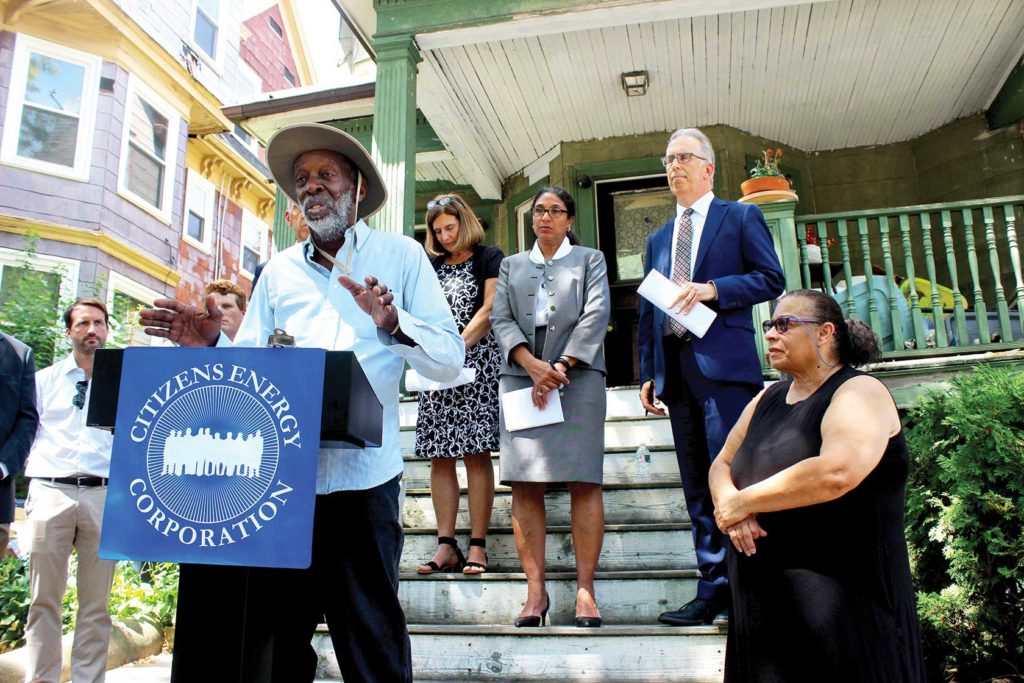
Former U.S. Rep. Joseph Kennedy III and several representatives from local organizations that provide reduced-cost and no-cost energy to low-income residents came together in Roxbury last week to urge President Joe Biden to increase federal funding to $10 billion for fuel assistance programs next year.
The ask comes just a week after President Biden visited Massachusetts and promised to help states mitigate the effects of climate change, including combating extreme weather.
Standing outside the home of Phillip Mayo, a 75-year-old recipient of federal Low-Income Home Energy Assistance Program (LIHEAP) funds, Kennedy spoke about the need to fund the program, as unprecedented heat waves along with the cold approaching this fall and winter pose threats to vulnerable residents both in Massachusetts and across the country.
“These temperature extremes, which are getting more extreme with each passing year, [are] not just discomfort. Families cannot keep pace with soaring energy bills. Extreme heat incidents kill about 1,000 people in the United States every year,” Kennedy said.
Kennedy spoke of the extreme burden facing American households, with many low-income families paying up to 40% of their income on heating and cooling.
He also noted that inflation is exacerbating high oil and gas costs, impacting gas heating and cooling, with U.S. electricity generated in large part by gas-fired power plants.
“It’s important that it’s a $10 billion agreement,” he said. “The value of every dollar for heating oil assistance erodes by 50% when prices double, as they have this year. Just to keep pace with those increases, more resources are needed, and we know that cooling assistance is a need that is not going away as the earth heats up further.”
Last year the LIHEAP funding was doubled to $8 billion, using money from federal American Rescue Plan Act (ARPA) funds, but without action from the president, the budget for the program is set to return to $4 billion despite the continuing price hikes.
Also speaking last Wednesday were representatives from Action for Boston Community Development (ABCD), one of the primary distributors of LIHEAP funds, and Michael Kennedy, representing Citizens Energy, a nonprofit founded by Joseph Kennedy II to assist low-income households with energy payments.
According to Sharon Scott-Chandler, president and CEO of ABCD, her organization saw a huge need in the last year, serving more than 24,000 customers in the greater Boston area with a maximum benefit of $2,100 for households with incomes at 100% of the federal poverty level.
“Yet with escalating prices and bitter cold, folks still exhausted benefits,” she said Wednesday. “By April, 75% of our clients had used up their benefits and were under great strain. Looking ahead, if we don’t secure the requested funding, many vulnerable elders and families will find themselves in crisis.”
Mayo, who’s lived in his Roxbury home for decades, said that before ABCD stepped in to help, he was facing a dire dilemma, with a leaking oil tank and a fixed income.
“It’s not easy getting through a cold winter,” Mayo said. “The price of oil is going up over 100%, and we can’t do it without your help.”
Valerie Saucer, a Dorchester resident who also became an ABCD client this year, said she, too, had problems with her oil tank and faced having to go without crucial heating and cooling before LIHEAP assistance.
“Over a winter I was paying close to $5,000,” she said. “On a fixed income it’s very, very difficult to do.”
In all, 11 people signed a two-page letter to Biden. The letter urged the president to “make sure that there’s enough fuel in the LIHEAP assistance tank to avoid a deadly summer toll due to rising heat and a winter of bitter discontent among those least able to afford skyrocketing energy prices.”






